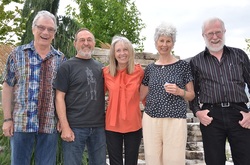
To emphasize the links between the creative and the critical, the course was interwoven with a two-day “Poetry Off the Page” event of readings and discussion. The invited writers – myself and George Bowering, Daphne Marlatt, Sharon Thesen, and Fred Wah (that's us in the cheerful photo, above, by Paul Marck) -- were all ones who had also been editors, worked with early tape-recorded materials, and had produced creative, critical and creative-critical publications. The organizers – Dean Irvine, the director of the Editing Modernism in Canada project, and Karis Shearer of UBC (Okanagan) – tell me that Phyllis Webb, a poet who has created and edited much taped-recorded work for the CBC, was also invited but unable to attend. Poetry off the Page was marked as a kind of “50th anniversary of the
Sharon, Daphne, George, Fred and I were given a “roundtable” opportunity to discuss our experiences of working with reel-to-reel, cassette, and MP3 recording. Sharon recalled the task of transcribing taped interviews and the question of whether their orality would be preserved or whether they would be edited and ‘corrected’ into a more organized discourse. I spoke about the first availability of 4-track reel-to-reel tape recorders in 1959-60 and about the surprisingly quick adoption of them by poets in Vancouver to access new poetry and study unpublished lectures on poetics. George spoke about the recording of the Sir George Williams University (now Concordia) poetry series. Daphne emphasized the tape recorder’s importance for her in poetry composition, recalling how parts of the interviews she had taped with women in Steveston for the BC Oral History project had become parts of her long poem Steveston. Fred talked about his role in recording the 1962 Robert Creeley lectures at Warren Tallman’s house and his recording of the 1963 summer poetry workshop events – how rudimentary the one-mike and portable tape machine equipment seem in retrospect. We all made other observations too, but that’s about all I can remember – fortunately the roundtable was being recorded! In the discussion period we were all part of a reflection on whether our poetry has been primarily aural or written – whether our poems have first come into being as aural events, which we have transcribed into written form, or have been composed as written texts that we later read aloud. I remember talking about the importance of “notation” in the writing of many poets, and its parallel to musical notation. It was Daphne, I believe, who recalled Roy Kiyooka speaking his poems out loud to himself before recording them on paper – a process with which I think all of us could identify with to some extent. Sharon usefully mentioned how poststructuralist theory complicates such experiences of composition, and we had a brief discussion of Language poetry and poetry readings. I mentioned the use by Charles Olson’s editor, George Butterick, of Olson’s poetry readings as sources of variant ‘editions’ of his poems – i.e. as being equivalent to variant versions of poems in print editions. Another important part of our discussion was the recalling by Sharon of the obsessive tape recording done by Gerry Gilbert both for himself and for Vancouver’s Co-op Radio, and by Daphne of the numerous tape recordings made by Kiyooka. With luck, these recollections may result in the location and/or digitization of their tapes. Tape is often more likely to be discarded or damaged than are paper records – despite the recent creation of digital archives such as SpokenWeb and Penn Sound.
FD
 RSS Feed
RSS Feed